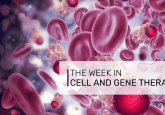Top 3 grants in regenerative medicine: April 2023

This month’s top grants in regenerative medicine, sourced from Dimensions, include projects on: whether GPR37 signaling can enhance the formation of new neurons following stroke, developing a microfluidic technology to enable high-throughput production of well–vascularized cerebral organoids and understanding translational regulation during the reprogramming of fibroblasts into induced cardiomyocytes.
Check out this month’s top grants in regenerative medicine:
Could GPR37 enhance regeneration following stroke?
Neural progenitor cell (NPC) transplantation is an innovative approach, which has been shown to improve both functional and behavioral outcomes following stroke. However, the implementation of this treatment option is limited by the current survival, proliferation and regeneration rates of NPC transplants. It has recently been shown that the G-protein coupled receptor, GPR37, protects the brain from stroke and plays a role in the regulation of NPC physiology through its interaction with the Wnt signaling pathway. This pathway is necessary for the formation of new neurons. The purpose of this project is to establish whether GPR37 signaling can enhance the formation of new neurons following stroke-like damage.
Funding amount: US$154,000
Funding period: 1 April 2023 – 31 March 2025
Funder: American Heart Association (AHA)
Research organization: Smith College (MA, USA)
High-throughput organoid engineering
This research aims to address the technology gaps in the generation of organoids, namely reproducibility, controlled maturation and vascularization. The project will build upon previous research on droplet acoustofluidics to develop three microfluidic modules, which will be integrated into an organoid engineering pipeline. Acoustophoresis will be utilized to encapsulate stem cells in hydrogel droplets and develop a microfluidic platform for the controlled differentiation of these cells. Lastly, a vascular network will be integrated within the organoid structures using two-photon writing. Overall this project is expected to produce a microfluidic technology to enable high-throughput production of well-vascularized cerebral organoids.
Funding amount: US$3,147,024
Funding period: 1 April 2023 – 31 March 2028
Funder: European Commission (EC)
Research organization: Uppsala University, Sweden
Understanding translational regulation during cardiac reprogramming
Using the adult zebrafish heart as a model, the present project will investigate how regeneration after injury is orchestrated by the multiple different cell types. The team will establish which cell types react to injury and develop new experimental and computational strategies to measure their activation profiles as well as investigate what mechanisms are responsible for inducing cell state activation following injury by utilizing single-cell transcriptomics and open chromatin profiling to infer gene regulatory networks. This research also aims to reveal pro-regenerative cell types and understand their role in the regenerative process. Combining this information will provide the first comprehensive insight into how activation of different cell types leads to a synergistic response in the regeneration of injured organs and will provide avenues for future investigation into the regenerative potential of the heart.
Funding amount: US$2,222,071
Funding period: 1 March 2023 – 29 February 2028
Funder: European Commission (EC)
Research organization: Max Delbrück Center for Molecular Medicine (Berlin, Germany)
Brought to you with support from:






